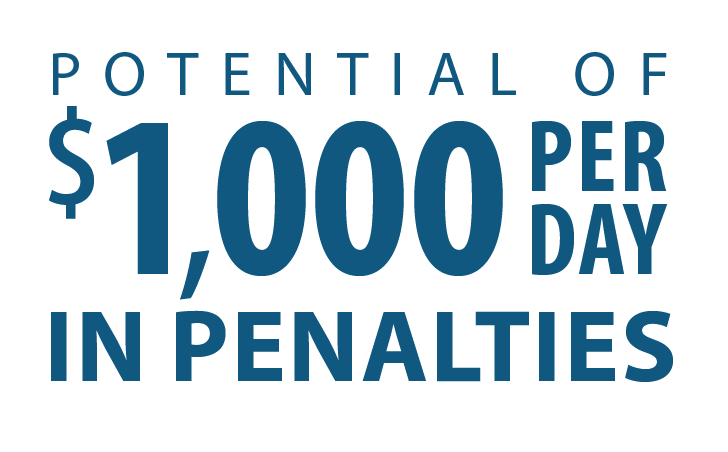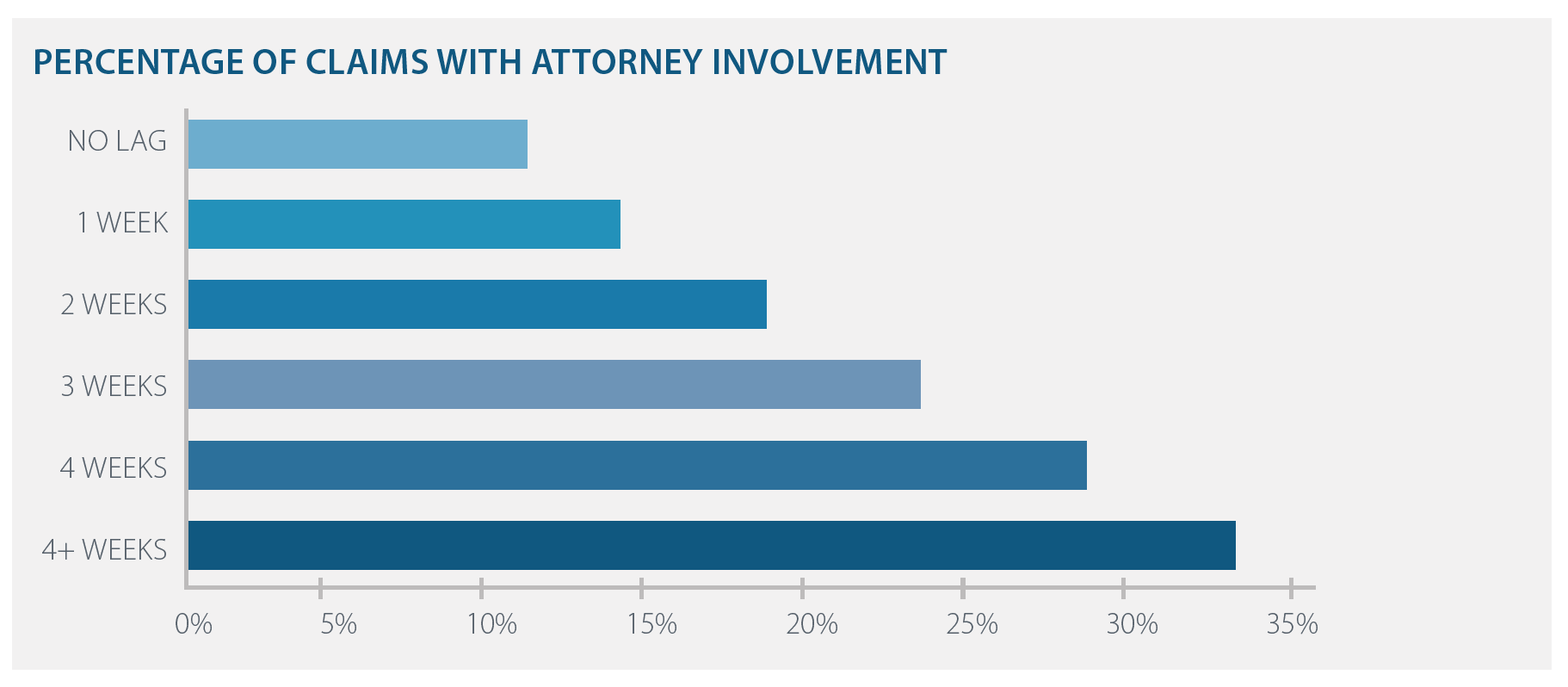WORKER’S COMPENSATION: THE COST OF DELAYED REPORTING
Many insurance agents today can project the cost impact a claim may have on years of future workers’ compensation insurance expenses. These analytics consistently show that in many instances, an employer will pay more, via higher premiums to their insurance company over a three-year period, than what the insurance carrier paid for the claim itself.
As a result, employers often ask us about the reporting of injuries and if it is possible to just pay for their own workers’ compensation injuries, or if their carrier will consider accepting “report-only” claims. While we encourage discussions on claims strategies, incident rates and experience modification factors, there is much more than the bottom-line at risk when an employer delays or fails to report an injury in their workplace.
Most states have penalties for failure to report an injury. These penalties could cost you up to $1,000-per-day for every day the injury is left unreported. Other federal agencies can levy fines in addition to the state workers’ compensation regulators. It is important to note that there is no coverage provided by your insurance policies for these fines and penalties.

Those of us, who have managed workers’ compensation claims, encourage our clients to report all injuries and do it immediately, upon knowledge of the incident. We have seen, firsthand, the impact to employers of late reporting. It is imperative to have a corporate policy and institute a culture of not only safety in your workplace, but also timely claim reporting. Only by shifting the culture of your organization will you truly control the overall cost of risk.

Delayed reporting jeopardizes your ability to thoroughly investigate the injury and surrounding circumstances.
Witnesses forget or are unavailable, evidence has been destroyed or removed and opportunities to prove fraud or recover monies through subrogation against a third party have disappeared. Additionally, your carrier has legal timeframe restrictions by which they must admit or deny the claim. Delaying notice of the claim can inhibit their ability to investigate or deny workers’ compensation benefits. Documenting all discussions with your injured employee is another important risk management feature. Deployment of that feature is less likely to occur if the incident has never been reported.
This early period after an injury is also a crucial time to convey compassion toward your injured worker, and ease their concerns. It could be an employer’s only time to reassure the injured worker of your commitment to their quality care, speedy recovery and modified-duty options.

If your company maintains and enforces a drug-free workplace policy, a delay in reporting the injury can also impair your ability to test the injured worker for any illicit drugs that may be present in their system. Many states offer premium credits for having these programs in place, while other states allow for a reduction of benefits, or even full denial of the claim – all of which means savings for your company.
We highly recommend that you establish a standard and internal written policy on the reporting of workers’ compensation injuries. It may be same-day, same-shift, within eight hours, or within 24 hours, but reporting a claim should never be delayed beyond 48 hours. We have seen instances where a supervisor or manager was notified of an injury but failed to notify the staff member responsible for reporting the injury to the insurance carrier. It’s crucial to train your managers on your company’s reporting policies and then hold them accountable when they fail to follow these rules. The clock on penalties begins to “tick” from the moment the employer has knowledge of a potential injury, so the failure of a supervisor to notify the company can mean thousands in fines alone.
Regardless of whether or not your employee believes their incident is a serious injury, every injury should be reported. Employees often think they will feel better over the weekend, only to end up in the emergency room. Every effort should be made to train employees on your company policy to report a work-related incident immediately. Employees are typically not aware that they could jeopardize their own benefits by reporting the injury late. Their failure to report their injury can also result in serious medical complications and greater permanent disability, further delaying their recovery and adding to the overall cost of the injury to your firm. Delayed treatment of an injury may even threaten the employee’s future ability to return to the same work that they were initially hired for.
“This early period after an injury is also a crucial time to convey compassion toward your injured worker, and ease their concern.”
“Go beyond just displaying notices. Take time to share the importance of injury reporting with all your employees.”
Most states have requirements to post notices to employees on workers’ compensation benefits. These notices may include names and locations of your designated medical provider (where allowed by law). Go beyond just displaying notices. Take time to share the importance of injury reporting with all of your employees. Remind them of their value to the company, the cost of this important benefit you provide for them and your commitment to them and their families to keep them safe and provide medical attention when they are injured. Some employers will remind employees of this benefit throughout the year, through emails, payroll stuffers, or in safety meetings.
It is important to note that the employer and injured worker are not the only ones that injuries impact. Co-workers may have to work longer hours to cover the job of the worker who is injured. When the employer doesn’t believe an injured worker and doesn’t report the injury, it conveys a message to all employees about trust. The failure to report can reflect on the culture of your company and impair your ability to keep skilled and conscientious workers.
Early reporting of injuries and communication with employees can make the difference in a worker seeking legal representation. The National Council on Compensation Insurance (NCCI) revealed in a 2015 study that less than 13% of claimants had attorney involvement for those early reported claims, versus nearly 32% of workers that sought legal representation for those claims reported more than four weeks after they occurred. States such as Florida have recently eliminated their cap on legal fees for attorneys representing workers’ compensation claims, making future legal costs of such litigated claims even more expensive for many employers.

Attorneys were involved in 12.8% of claims made the day of an accident, rising to 31.7% for claims made more than four weeks. (National Council on Compensation Insurance: “The Relationship Between Accident Report Lag and Claim Cost in Workers’ Compensation Insurance”, Jan., 2015).

Some states fine for both late reporting and retaliation, so you should always seek advice from your agent, carrier, or attorney if you are considering the termination of an injured worker.
If your industry is susceptible to injuries from sprains and strains, NCCI recently estimated that the difference between a sprain/strain injury reported in week one and those reported in week four resulted in a 70% increase in cost. A contrasting study by a national workers’ compensation carrier revealed that the cost of injuries left unreported for several weeks, could increase the total cost as much as seven times.
Using best practices, developing policies and reporting claims within 48 hours has proven to reduce costs. It’s a moderate investment that is worth serious consideration and one that is shown to improve your bottom line, reduce your overall risk and is appreciated and valued by the employees in your care.
ABOUT THE AUTHORS

SONJA GUENTHER has nearly forty years in the insurance industry and is a recognized national expert in the field of workers’ compensation insurance. She is a published author and has written numerous articles on workers’ compensation topics. She is committed to education on workers’ compensation issues and is an awarded speaker to both local and national groups. She has helped to draft several pieces of workers’ compensation legislation, testifying on many occasions before state regulators and legislators.